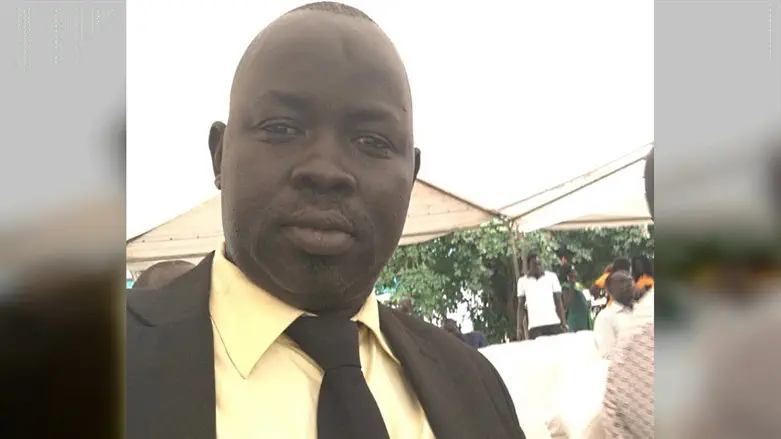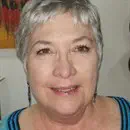
Augustino Mayom Makuok was just 16 when he ran away from war-torn South Sudan. At 23, he found a way to enter Israel and he stayed here for six years, until in 2012, about a year after independence was declared, all South Sudanese refugees in Israel were sent home.
I had not known him when he was in Israel, but I met him in Juba, the capital city, less than a year after his return to South Sudan when I was there on a project with IsraAID. He was happy to speak Hebrew, happy to meet an Israeli, for the country had special meaning to him before he arrived and even more so after having lived here. He was upbeat and optimistic about his future and that of South Sudan.
But civil war broke out in 2013 and the country experiences repeated upheavals. I reached out to Augustino to hear how he is doing now. Because Internet services are so unreliable in South Sudan, we had to conduct the interview by a series of messages.
First of all, Augustino, tell me how you are doing now.
Currently, things are not easy. Life is very tough but we are surviving. We are pushing hard to make it. Now I am employed with a local private contractor working with oil and gas companies in South Sudan. For two years, we haven’t had any active projects. Recently we just signed a contract. We are going to implement it in March or April, looking for oil and gas in the Upper Nile.
My personal life is very complicated because when I was in Israel, I married one of my clan and we have a daughter, Esther, who was born in Israel. They are now living in Cairo, Egypt; Esther will turn 13 in the summer. I have two other children here in Juba, a boy and a girl, each with different mothers. My son, almost 8, is now attending school in Uganda. His education is sponsored by Taal Goldman, my adopted kibbutz mother from Kibbutz Yotvata.
My daughter is with her mom in Rumbek, north of Juba. In January 2020, I married in a traditional official South Sudanese marriage and we have a two-year-old daughter.
My wife is not working because she wants to go back to school to study nursing and this is our plan at the moment. She has lived in South Sudan throughout her life, through all the conflicts.
You mention Taal Goldman. You are in touch with her until today, right?
I thank God for the Goldmans and their friendship that we have from Israel and to South Sudan. Taal Goldman, and all members of Kibbutz Yotfata, give the opportunity for our kids to study in Uganda. The schooling of two other former refugees who were with me on the kibbutz is also sponsored by members of the kibbutz [through the Come True Project helping children of South Sudanese refugees who were in Israel until independence].
I will never forget this. And there will be a connection between our kids and Israel when they grow up. I appreciate this so much.
Now let’s go back to the beginning. How did you get to Israel?
Coming to Israel was in my blood from the time I started to know the Bible. I had the dream of coming to Israel one day, even to just pay a visit to the Holy Land.
When war intensified in South Sudan, I moved to Khartoum with some friends. They were older than me but we all left without our parents’ knowledge. We only stayed for a few months because the Khartoum government wanted to recruit us to join the army and fight the SPLA in the south, in other words, against our own people.
We moved from there to Egypt, settling first in a church and then staying with friends because Egypt didn’t have camps for refugees. I applied to UNHCR and was granted a refugee card. I stayed in Egypt for six years and nothing happened about resettlement.
One of my friends and I brainstormed about what we could do and we decided to go to Israel. We hoped it would be possible. We found a Bedouin guy and made an agreement with him. He took us from Cairo to Arish, in the Sinai, south of the Israeli border. We drove the whole night until we reached Arish. In the morning, when we sat in his house, he came to us, collected the money that we had agreed on as the price for getting us to the border. We stayed there until the evening. That night we would be moving to Israel. I was so happy because my dream was about to come true.
And then at night, around 9 pm, he took us by car up to the border. From there, we ran some minutes and then we crossed the border. It was a good journey but tough, but you see, coming to Israel is not easy yet God made it possible for us to go to Israel.
We came to the border crossing and went to the Border Police. They took us to a camp in the Negev. They gave us food and sleeping bags. In the morning, they came to interview us and in the afternoon they took us to a prison where we there were a lot of other Africans. We stayed there for six or seven months, until those from UNHCR came from Geneva to interview us; we showed them our cards and they saw that we have refugee status. We were in the prison for another four months and then they started to release us.
I understand you spent six years on Kibbutz Yotvata. How did that come about?
We were sent to a moshav at first – we were about 20-30 people. We worked on the moshav but the environment was not conducive. For example, they put four people in a very small narrow room. My friend Francis and I spoke with Anat Ben Dor, who used to be in charge of refugees, about Kibbutz Yotfata where we had a friend. Anat talked with Taal Goldman and she facilitated our moving to the kibbutz.
I was a young man and quite energetic at that time. We had a very nice time on the kibbutz. There were good interactions with the people. All the people on the kibbutz were friendly to us. We stayed there until the moment we were sent home.

What did you think about going back home?
When I heard we were going back to South Sudan, it was good news. I was happy to go back to my country, but I was not prepared to go back so quickly like that, without preparation. The government should have given us about a year to get ready.
What impact did the stay on the kibbutz have on you?
My experience taught me a lot of things. It taught me to work independently and to open my mind. The experience in Israel keeps me alive now because of all that I learned there.
On the kibbutz they pointed at some trees and told me they were planted in 1957. So when I returned to South Sudan, I saw what was there at the time and I had a vision of what it will be like thirty years from now. I learned that the future belongs to those who prepare themselves, so it will be better if we South Sudanese prepare ourselves and build South Sudan the way Israelis did in their country.
When I came to Juba with friends I had met in Israel, we had an idea about doing business and so we rented land with an empty shell of a building and opened a shop. The people around us were very happy to do the same and they asked us for advice about how to set up a shop.
We ran the shop until the war in 2013 when we had to run for our lives. The shop was looted by soldiers and the rebels. When we came back, we found nothing left. We started to build it again with the little that we had. So we push and push and push -- until 2016 and the war started again and we had to move on.
When I was in South Sudan, you told me about your dream of setting up a kibbutz. Does that still seem possible to you?
We went to Terekeka, a town north of Juba, and spoke to the administrators there and they agreed to give us land but it didn’t work out because of lack of security. But I still have that plan in mind. Once the situation in South Sudan is stable, I am going to set up a kibbutz. Not in Terekeka, I will get a good place around Juba and will set up the kibbutz with friends.
We will grow vegetables and fruits using the knowledge we got in Israel, and we will give people jobs so that they can live a good life too. We will bring people here from the kibbutz to help teach us how to do that.
We have talented people in South Sudan, people with a lot of inspiration to do good for the country, but we don’t have good governance and that is holding many back.
